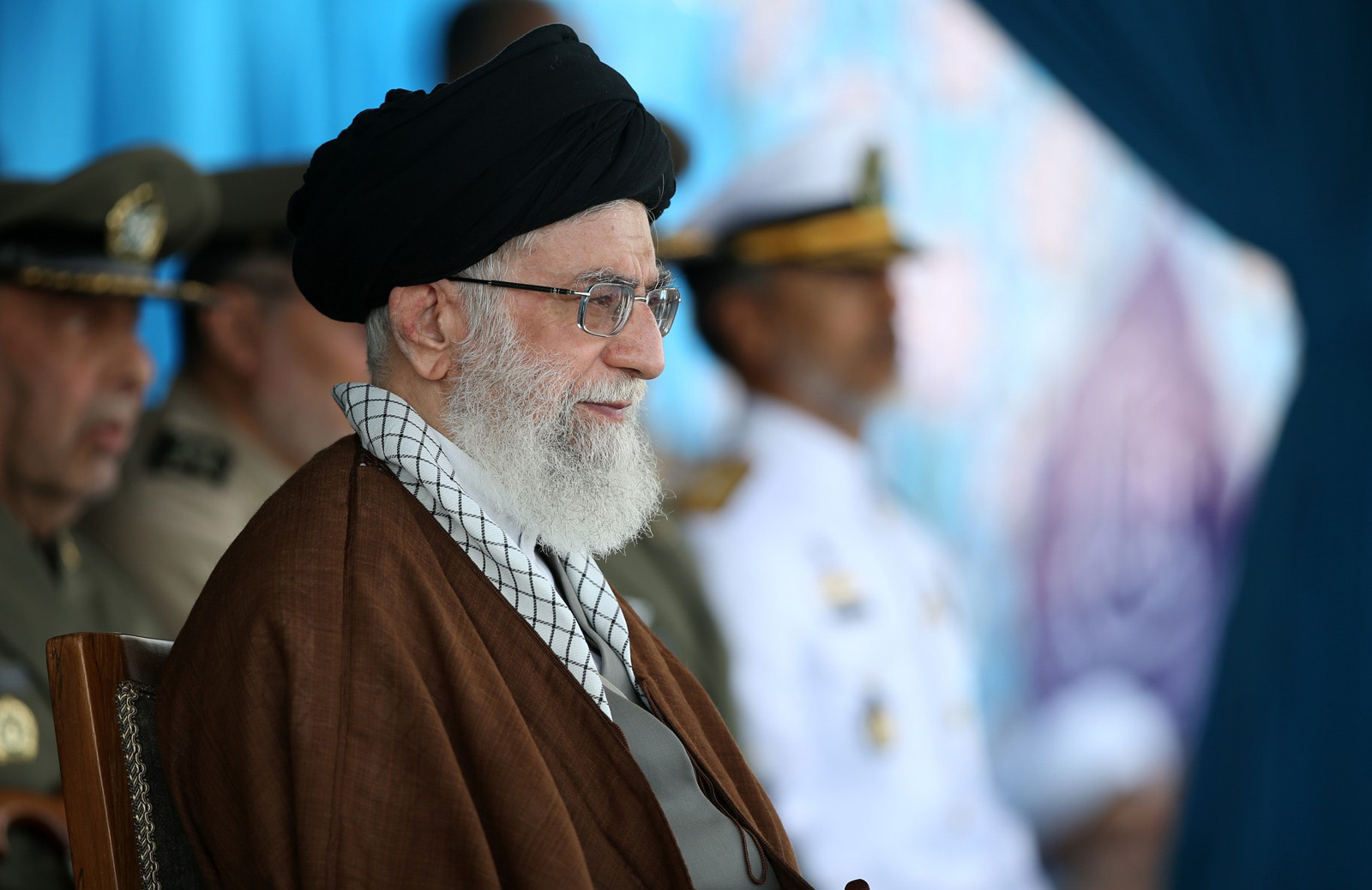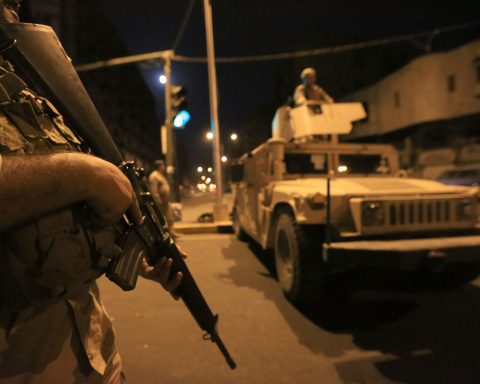In order to listen to the article, click on the audio clip below:
A dozen ballistic missiles fired from outside Iraq hit a neighborhood near the US consulate complex in Erbil, the capital of the Kurdish Regional Government of Iraq (KRG), on March 13. Iran’s Islamic Revolutionary Guard Corps (IRGC) claimed responsibility for the attack, stating they targeted “the strategic center of the Zionist conspiracy and evil.” Although the attack on Erbil is not the first of its kind, the targeting of the city has a variety of regional and domestic causes and repercussions.
Message to the US-Israel axis
Despite the IRGC statement implying the existence of secret bases of Israel’s Mossad spy agency in Erbil, Kurdish officials denied the presence of such bases in the city. Iranian news agencies close to the IRGC went further and stated that the attack was in retaliation for two Iranian colonels reportedly killed during an Israeli airstrike in Syria. Pro-Iranian militias allegedly targeted the Mossad base in Erbil last September too. Targeting Erbil, in reprisal for Israeli attacks in Syria, shows Tehran’s retaliation capacity and limits against Tel Aviv.
The recent attack is the second ballistic strike since General Qassem Soleimani’s death, who was the head of the IRGC’s Quds Force, in a US attack in January 2020. In response, Iran launched a retaliatory missile attack on Al-Asad military base in Iraq’s Anbar province, where more than 100 soldiers suffered traumatic brain injuries in the blasts. Retaliation attacks also expanded to the Harir military base in the KRG. Thereafter, US forces stationed at Erbil’s international airport complex were occasionally targeted, for which the US officials blamed pro-Iranian militias.
Iran seems to continue avenging Soleimani as the timing of the recent attack is meaningful in terms of coinciding with Soleimani’s birthday, March 11. Furthermore, considering the ongoing Russian war in Ukraine, Moscow may aim to send a message – through its regional ally Tehran – to Washington to deter further US involvement.
Finally, Iran desired to show its dissatisfaction with the strong US-KRG relations. Even though Kurdish parties maintain good relations with Iran, they are strategically viewed as part of the Western axis. One of the largest US military bases in Iraq, the Harir military base, is located in the KRG itself. Also, the US consulate in Erbil is one of the largest complexes in the region. These connections make Erbil a relatively easy target for Tehran to message the US.
Excluding the government
Domestic responses toward the attack were harsh. Iraqi Shiite cleric Muqtada al-Sadr demanded that “Iran should be immediately complained to the UN and that a note be given to Iraj Masjedi, Iran’s Ambassador to Baghdad.” The Iraqi Foreign Ministry summoned Masjedi and handed him a note to protest the attack. Also, a day after, Iraqi Prime Minister Mustafa al-Kadhimi arrived in Erbil to meet with Kurdish authorities. Considering the KRG as a part of Iraq, attacking Erbil means the violation of Iraq’s sovereignty.
The Sadr Bloc, the Sunni coalition, and the Kurdish KDP attempted to form a government excluding pro-Iranian forces. Considering that the attack came a day after al-Sadr met with pro-Iranian actors in Najaf, the attack may be a threat to al-Sadr and his allies. At the end of the meeting, al-Sadr reaffirmed his commitment in a brief statement that would establish “a non-eastern, non-western, but national-majority government.” This statement means that pro-Iranian groups will continue to be excluded from the government. Iraqi President Barham Salih has already stated that the purpose of these attacks was to prevent the establishment of a powerful government in the country. After the attack, al-Sadr and the Kurds can be expected to be stricter against pro-Iranian groups during the government formation process. This may mean that government formation talks and the months-long political impasse in the country could be prolonged further.
Turkey’s pursuit of Iraqi gas
On February 2, KRG President Nechirvan Barzani met with Turkish President Recep Tayyip Erdogan in Ankara. Erdogan stated that Turkey seeks a “win-win” deal with Iraq to import gas, which Barzani helps negotiate with the Baghdad government. The meeting occurred after Iran informed Turkey on January 20 that its gas deliveries would be halted for ten days. Given Iraq’s reliance on Iranian natural gas to meet its electricity demands, any rise in gas production will gradually wean the government off its reliance on Iranian energy imports. So, the recent attack could potentially be interpreted as a warning to initiatives between Ankara and Erbil on possible gas trade as an alternative to Iran.
It is no secret that Iran and its militias are uncomfortable with Ankara-Erbil relations and Turkey’s military operations in northern Iraq. Threat messages from militias and occasional attacks on Turkish military bases are indicators of this discomfort. As a matter of fact, referring to the last Erbil attack, Iran’s newspaper “Vatan Emroz” used the phrase “The missile fired from Tabriz shook Erdogan.”
Vienna talks at stake?
The attack also comes amid a pause in talks in Vienna between Iran and world powers that aim to restore Iran’s nuclear deal. Considering the IRGC’s close relationship with Iran’s Supreme Leader Ali Khamenei and his lack of support for nuclear negotiations, another purpose of the attack may be interpreted as a message to these talks. The 11-months long talks were paused on March 10 by their European hosts. Although Iran and the US have reiterated their willingness to reach a final agreement in the Vienna talks, Washington is likely to become less tolerant of Tehran after the attack.
After the strike, Iran-backed Iraqi militias are likely to attack Erbil and US presence in Iraq. Militias have launched attacks on US military bases and diplomatic missions in the country since Soleimani’s death. Responding to every attack with retaliation, the US also put Iran-backed militia groups and their leaders under Iraq’s official recognition of the Popular Mobilization Units (PMU), the umbrella organization controlled mainly by pro-Iran armed groups, on its sanctions and terrorism list. Also, in January 2020, the US imposed sanctions on Falih Fayyad, the head of the PMU Commission, and put PMU chief of staff, Abu Fadak, on the “Specially Designated Global Terrorist” list. If these attacks continue, it seems inevitable that the US will respond and escalate the tension further through military retaliation and by imposing more sanctions.














